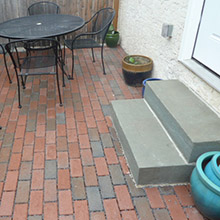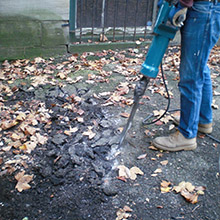De-paving and Permeable Pavers
What are de-paving and permeable pavers?
 |
Removing impervious surfaces like concrete or asphalt allows stormwater to soak back into the ground as nature intended. De-paving or installing permeable pavers will prevent stormwater from running off your property and into the City’s sewer system. With a variety of follow-up treatments available, we can help to renovate your patio or driveway and manage stormwater at the same time! Cost: Rain Check will contribute $8 per square foot for de-paving or $15 per square foot for de-paving with a follow-up treatment of porous pavers. Both projects have a maximum contribution of $2000. |
About de-paving and permeable pavers:
- There are a lot of follow-up treatments to removing pavement including, landscaping, a rain garden, a lawn, permeable hardscape, and more. As long as you are turning an impervious surface into a pervious surface, you qualify.
- Not sure about what follow-up treatment is right for you? Our team can help you decide what project is best for you and our expert contractors can provide you with a wide menu of options.
- We make the call for you! All de-paving projects require a phone call to the PA One Call (“Call Before You Dig”) hotline. This will ensure that no underground utilities are disturbed during the project.
- If your patio or driveway is already in a state of disrepair, replacing it can have a beneficial impact to the value of your home.
- Porous pavers come in a wide variety of sizes, colors, and patterns.
- Worried about water in your basement? Prior to de-paving, we will inspect your basement for existing signs of moisture. If the de-paved area directly abuts your home, an impervious liner will be installed against your exterior foundation wall, preventing the possibility of water getting into your basement.
- All masonry projects must be on your property. Rain Check will not de-pave sidewalks or any other area that lies in the public right-of-way.
- All of our masonry contractors follow guidelines from the Interlocking Concrete Pavement Institute (ICPI), the foremost authority in permeable pavers and hardscaping.
Maintaining your new space:
|
Proper maintenance depends on the follow up treatment you choose.
|
 |
To remove paving or have permeable pavers installed at your home, click here to sign up for the Rain Check cost-share program and an assessor will visit your home to determine if de-paving or permeable paving is right for your home.